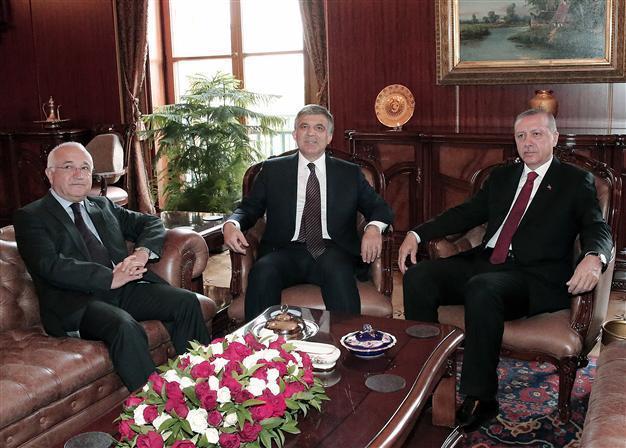President Erdoğan and former President Gül hold surprise meeting in parliament
ANKARA

AA Photo
Turkish President Recep Tayyip Erdoğan and former President Abdullah Gül held a surprise meeting in parliament on June 19, the first such meeting since the June 7 general election.
Erdoğan and Gül met in the office of Parliament Speaker Cemil Çiçek for around an hour.
The meeting came after the two politicians, long-time comrades who were founding members of the Justice and Development Party (AKP) in 2001, both attended the official ceremony in Ankara for late President Süleyman Demirel, who passed away earlier this week.
The meeting came after the publishing of a book by Ahmet Sever, who served as an advisor to Gül for 12 years, which revealed a number of splits of opinion between Gül and Erdoğan.
The book “Abdullah Gül ile 12 Yıl” (12 Years with Abdullah Gül), which hit bookshelves on June 14, paints a portrait of Erdoğan and Gül facing a serious split of opinion on a number of key issues, including the government’s Syria policy, the 2013 Gezi Park protests, and free speech.
Gül issued a written statement on June 16 rejecting claims that the book was dictated or approved by him, or that it reflected his personal opinions.
“I did not in any way offer any guidance or intervene during the preparation phase [of this book]. On the contrary, I even told Ahmet Sever that I was not keen on the idea [of publishing the book],” Gül said.
Sever, however, has said that Gül read the whole book, and even made some corrections.
In the book, Sever writes that Gül told Erdoğan and AKP seniors after the spate of illegal wiretappings and corruption probes in 2013 that the accused ministers should either be dismissed or resign.
“If they are sent via a censure motion, then you will be in a difficult position,” Sever quotes Gül as saying in the book.
Nevertheless, he maintained that the four former ministers - Egemen Bağış, Erdoğan Bayraktar, Zafer Çağlayan and Muammer Güler - should be kept out of the cabinet, the book concluded.
The future of these former cabinet members, who were cleared in a parliamentary vote thanks to the AKP’s majority, remains a core issue in today’s coalition talks.
Disagreements over foreign policy, Gezi protestsAccording to the book, in a meeting with his consultants before the presidential election in August last year, Gül said that if he retook the prime ministry seat after Erdoğan becomes president then he “would return Turkey to the period when its star was shining.”
The AKP held its first congress after Erdoğan was elected president on Aug. 27, only one day before Gül’s post formally came to an end. At the congress, former foreign minister Ahmet Davutoğlu was chosen as the AKP’s new leader and prime minister, closing the door on Gül’s path.
Sever also writes that Gül told Davutoğlu personally that he and Erdoğan had gone to too far in getting involved in the politics of Middle Eastern countries, “acting like Egypt’s or Syria’s prime minister and foreign minister,” which he said this would harm Turkey’s interests.
On the Gezi Park protests of the summer of 2013, Sever says Gül and Erdoğan’s stances were totally different, with Gül believing that the protests should have been handled more sensitively from the start.
